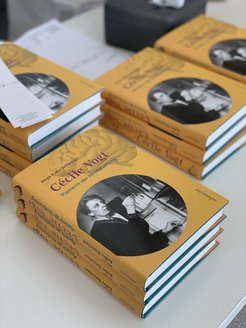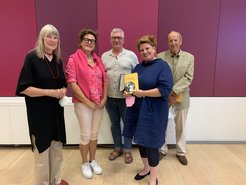Cécile Vogt: Gender, Politics and the Perception of Excellence in Brain Sciences
A panel discussion on the recent biography of Cécile Vogt, a pioneer of brain sciences and co-founder of the Kaiser Wilhelm Institute for Brain Research
Neuroscientist Cécile Vogt (1875-1962) is one of the important pioneers in 20th century science, and has regrettably been overshadowed by the memory of her husband Oskar, also a neuroscientist, after her death. Gender and politics in German science were some of the themes of a panel discussion, held on July 4 at the MPI for Brain Research, with Professors Erin Schuman and Gilles Laurent, both directors at the Institute (and incidentally also married to each other), with Birgit Kofler-Bettschart, the author of the biography of Cecile Vogt, and with MPI Director Emeritus Professor Heinz Wässle, who has written extensively about the history of the Max Planck Society. Science journalist Regina Oehler moderated the discussion.

A slide show of images of the life and work of Cécile and Oskar Vogt ran on the screen of the MPI for Brain Research lecture hall during the discussion. One image showed Cécile and Oskar in a corner of their lab, Cécile's right hand resting on a large microtome, a device used to section human brains into thin slices for microscopy. Less than a decade later, Cécile and her husband founded the world's largest and most modern brain research institute, the Kaiser Wilhelm Institute for Brain Research in Berlin-Buch. Oskar became director, while Cécile, head of a department, became a scientific member of the Kaiser Wilhelm Society but never a director. Both were repeatedly nominated for the Nobel Prize for their work on brain anatomy, and both were members of renowned academies such as the Leopoldina. "But after Oskar's death, only his achievements were appreciated, especially in Germany. Cécile was pushed out of perception." This summary can be read in the biography of Cécile Vogt, which the Austrian author Birgit Kofler-Bettschart wrote after extensive research.

Cécile Vogt was a brilliant scientist but also raised three daughters who also became outstanding scientists. "Cécile was ahead of her time. She recognized the challenges faced by female scientists in their daily lives and organized support for female colleagues in the lab, for instance, in the form of household support," Erin Schuman noted. Cécile was also a politically engaged contemporary who supported pacifism. At the same time, defense contractors for the German government provided financial support for the Vogt’s research: "How is it that several members of the Krupp family could be enthusiastic about this unconventional couple with very clear sympathies for the political left, for pacifist and anti-nationalist organizations? Conversely, how is it that Cécile and Oskar had no problem using Krupp's armaments money for their research? It is not easy to understand," writes Kofler-Bettschart.
After the National Socialists came into power in 1933, the situation for Cécile and Oskar Vogt became increasingly difficult. In late 1936 - early 1937, the Vogts left the institute they had spent their life building in Berlin-Buch and founded a private institute for brain research and general biology in Neustadt in the Black Forest. Cécile and Oskar were not involved in the crimes committed by some of their successors at the Kaiser Wilhelm Institute for Brain Research in Berlin, who played active roles in the Nazi euthanasia program so as to conduct research on the brains of murdered children and adults.
The life story of Cécile Vogt and her unknown legacy shines light on questions that are still relevant today: why are women scientists still often not recognized for their achievements, ignored or forgotten, and not given a full voice in dictating science policy? Should scientists take a clear stand in times of crisis? How should a scientist’s legacy be treated and viewed after their death? These are some of the complex questions that were discussed by the panel.
Text: Regina Oehler and Irina Epstein








